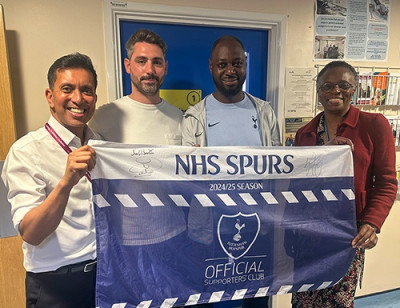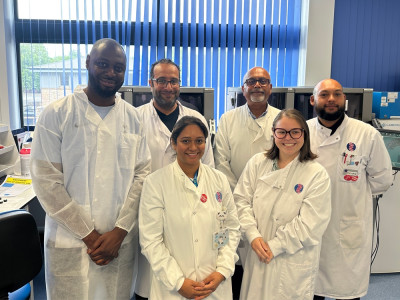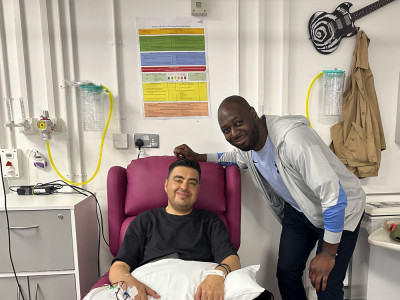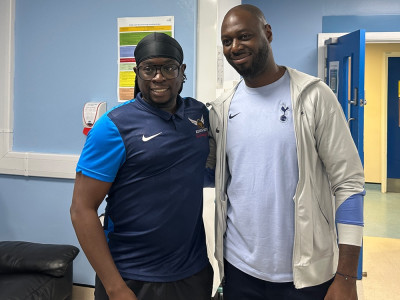
At the start of the tour, Ledley met with Dr Nnenna Osuji, chief executive of North Mid, Konrad Deckers Dowber, managing director of Advantage Mentoring, Dr Asif Mazumder, Vice President of NHS Spurs and other representatives supporting the campaign.
Ledley took part in a “journey of blood” experience at North Mid, visiting the hospital laboratories, the phlebotomy department, and the haematology day unit.
During the tour, he met dedicated NHS staff working behind the scenes to make every donation count, and patients whose lives have been forever changed thanks to the generosity of blood donors.
First stop: the laboratory
The tour began in the lab, where Ledley donned a white lab coat and had a go using the binocular microscope, gaining hands-on appreciation of the work involved. He learned how donated blood is tested, processed and carefully matched to patients in need. Led by Ryhan Anwar, head of specimen reception area at the Health Services Laboratories, the staff shared how their work helps ensure every donation is safe and effective.

Dr Nnenna Osuji spoke about the vital role of the lab in the donation journey: “Often it’s not seen, not always valued, but is incredibly important, and the team do an amazing job.”

Haematology day unit: meeting patients
Next, Ledley visited the haematology day unit to meet patients who regularly receive blood transfusions for conditions such as sickle cell disease and thalassemia. He listened to their stories and heard how blood donors have played a vital role in their treatment and improving their quality of life.

Thalassemia patient Dino, who has been receiving care at North Mid since he was six months old, emphasised the vital importance of blood donations. He said, “I come for blood every three to four weeks and rely on donations from all communities. Doesn't matter which team they support!”

King Sinkinson, a former Tottenham Hotspur staff member and patient with sickle cell disease, was passionate about raising awareness of the importance of blood donation for patients with sickle cell disease.
Ward manager Rhoda Amponsah reflected on the impact of blood donation from a frontline perspective: “For our patients receiving a transfusion, it can be an emotional experience, knowing that someone they may never meet has contributed to their well-being. By this, I'm encouraging more people to donate, which can enormously support our patient's needs. Every donation has potential to save lives.”
Nurse consultant Sekayi Tangayi spoke about just how vital blood donations are for patients living with lifelong conditions like sickle cell and thalassemia: “Blood transfusion is very important to our patients, especially those with sickle cell. An individual with sickle cell might require anywhere between eight to 12 units of blood every four weeks. For our thalassemia patients, transfusions may be needed every two to four weeks.” She emphasised that blood donation truly is a matter of life or death for people born with these genetic conditions.
Phlebotomy visit
The final stop was the hospital’s phlebotomy department, where blood samples are taken for diagnosis and monitoring. Ledley met the team, led by Noeleen Behan, matron, who welcome hundreds of patients each week and play an essential part in each person’s healthcare journey.

Ledley King’s visit shone a powerful spotlight on the life-saving impact of blood donation and the critical need for more donors, especially from Black, Asian, and mixed heritage communities. His support alongside leaders from football, health, and community organisations, sends a clear message: donating blood saves lives, and representation matters.
Community-driven partnerships like this one help raise awareness, tackle inequalities, and bring donation conversations into new spaces, from hospital wards to stadiums.
While just under 800,000 people donated last year, only two per cent of the population currently donate, and it’s not enough. If one million people gave blood regularly, we could ease the burden on existing donors and better meet clinical demand.
There’s an urgent need for more O negative donors (vital in emergencies), and for donors of Black heritage, who are far more likely to have the Ro blood type needed to treat sickle cell disease.
Blood is essential not only in emergencies, but for people living with cancer, sickle cell, thalassemia, and other long-term conditions. Every donation truly does make a difference.
You can register now and book an appointment online, on the GiveBloodNHS app or by calling 0300 123 23 23.
The event was a collaboration between NHSBT, MHRA, NHS Spurs Official Supporters Club (a health and social impact group attached to Tottenham Hotspur Football Club (THFC), supporting the existing community work of Tottenham Hotspur Foundation - THF) and North Middlesex University Hospital and community services (part of the Royal Free London NHS Foundation Trust).
 Translate
Translate